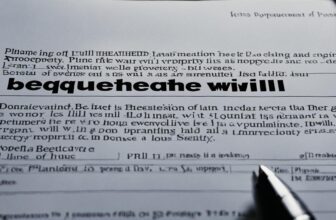
In today’s complex financial landscape, safeguarding your estate and financial assets is more critical than ever. Whether through wealth management, financial planning services, or estate planning services, there are multiple strategies for securing your financial future. As a high-earning professional or wealthy family, it is essential to work with expert firms like Blake Harris Law to develop a customized plan that effectively protect your valuable property from legal threats and unforeseen circumstances. In this article, we will discuss the importance of asset protection, legal tools, and planning strategies to help you achieve financial security.
The Essentials of Asset Protection Strategies
Asset protection is a preventative measure against potential threats to personal wealth. It is crucial for anyone seeking financial security and long-lasting wealth preservation. Armed with knowledge about estate planning services, individuals can wisely use legal tools such as trusts and LLCs to ensure their assets remain secure even in the face of legal discovery, lawsuits, and other liability claims.
One of the foundations of a strong asset protection strategy is the formation of Limited Liability Companies (LLCs). By separating personal assets from business liabilities, LLCs offer protection through charging order limitations. This is particularly advantageous in jurisdictions like Wyoming and Nevada, which are well-known for their strong LLC protective statutes. Additionally, LLCs can minimize taxes while offering improved business flexibility.
Another fundamental aspect of asset protection planning lies in including robust insurance policies within one’s wealth management plan. Insurance serves as the first line of defense against liability claims, offering protection for both personal and business assets. By selecting comprehensive policies with ample coverage limits, such as umbrella insurance, individuals can build a strong barrier against potential financial loss resulting from unforeseen events.
In conclusion, an effective asset protection strategy incorporates a combination of legal tools, such as trusts and LLCs, along with well-designed insurance policies. By taking these measures, individuals can safeguard their wealth, preserve their estate, and enjoy continued financial security. Seeking professional estate planning services will ensure that personalized solutions are implemented, guaranteeing the best possible protection against potential threats.
Understanding The Importance of Discretion in Wealth Management

In today’s world, practicing discretion in wealth management is not only wise, but necessary to safeguard assets from legal threats. Flaunting one’s wealth can attract unwanted attention, exposing estate and financial holdings to potential lawsuits and other vulnerabilities. Utilizing legal tools and strategies to maintain a level of privacy can help shield assets and ensure long-term financial security.
Why Flaunting Your Wealth Can Be Risky
Displaying wealth and success can easily make you a target for opportunistic individuals seeking to profit from your accomplishments. Lawsuits and claims by creditors are just some examples of risks associated with a high-profile financial status. In order to protect your assets effectively, maintaining a certain level of discretion in wealth management is vital to stay under the radar and minimize potential legal challenges.
The Legal Tools for Effective Asset Concealment
When it comes to safeguarding estate and financial holdings, there are legal tools designed specifically to provide protection and privacy. Trust structures, for instance, allow assets to be protected from creditors while still in the public domain. This approach, also known as asset protection, ensures that your hard-earned wealth remains shielded against unforeseen legal actions.
Asset protection trusts, in particular, can deter legal threats by removing assets from personal ownership and placing them under the control of a trustee. This arrangement makes it harder for creditors to access your assets, even if ownership is disclosed. In turn, practicing discretion and employing legal frameworks for asset concealment can help secure your estate and financial holdings while keeping them out of the legal spotlight.
Forming a Limited Liability Company (LLC) for Business Owners

For business owners seeking to protect their personal wealth, forming a limited liability company (LLC) is a highly effective asset protection strategy. LLCs provide a robust shield against potential legal threats while offering multiple financial planning services advantages for owners, separating their personal assets from business operations. This section delves into the benefits of LLCs and how they operate to defend against personal liability.
How LLCs Serve as a Shield Against Personal Liability
An LLC is designed to protect the personal assets of its owners, also known as members, from company-related liabilities. Creditors and litigants targeting the business are generally unable to access the personal assets of LLC members, even in cases of legal action against the company. This separation between personal and business finances results in a substantial layer of asset protection for business owners.
The Intricacies of LLC’s Asset Protection Provisions
One of the key protection features offered by LLCs is charging order protection, which is available in many LLC-friendly states. Charging orders limit a creditor’s ability to seize a member’s interest in the LLC to satisfy a debt. Instead, creditors are often limited to a lien against the debtor’s share of the business, which does not give them control over the LLC operations or access to the company’s assets.
It should be noted, however, that charging order protection varies depending on state-specific regulations. Some states offer stronger protection than others, so consideration of the chosen jurisdiction is crucial.
Overall, the formation of an LLC provides business owners with a powerful tool for asset protection and financial planning services. By creating a clear separation between personal and business assets, LLCs serve as a robust shield against potential legal threats and promote responsible financial management for businesses of all sizes.
Asset Protection Through Insurance Policies

Insurance plays a crucial role in wealth preservation, safeguarding one’s assets from various liabilities. Incorporating multiple insurance policies with sufficient coverage limits is essential to fortify asset protection strategies and shield estate holdings from potential lawsuits.
The Role of Liability Insurance in Wealth Preservation
Liability insurance is critical in protecting one’s assets from unexpected legal challenges, such as personal injury or property damage claims. Policies like homeowners’, auto, workers’ compensation, and umbrella liability insurance provide a defensive barrier between one’s assets and potential liabilities. These policies ensure that the policyholder’s assets remain secure from claims exceeding their policy limits, ultimately preserving their estate’s value.
A well-rounded asset protection plan incorporates multiple insurance policies suitable for the client’s specific needs and risk exposure. In addition to liability insurance, other insurance types, such as long-term care policies, can protect individuals from significant costs that could quickly diminish their estate. By evaluating the relevant risks and acquiring ample insurance coverage for each, policyholders can ensure their wealth remains well-protected against various financial challenges and liabilities.
Safeguard Estate and Financial with Asset Protection Trusts

Asset protection trusts are a fundamental tool for securing liquid assets and maintaining financial security. Through the establishment of either a domestic or offshore asset protection trust, individuals transfer assets to the care of a trustee, which allows them to protect their wealth while still maintaining control over the management of these assets. When evaluating the options for setting up an asset protection trust, it is important to consider both domestic and offshore options, as each offers varying levels of protection and confidentiality.
Domestic vs. Offshore Trusts: A Comparison
Domestic asset protection trusts are established within the United States and are subject to U.S. laws and regulations. While they offer a level of protection, they may not be as effective as offshore trusts in providing immunity against domestic court rulings. Offshore asset protection trusts, on the other hand, are established in foreign jurisdictions such as the Cook Islands and Belize. Offshore trusts offer greater levels of protection, confidentiality, and asset security as they are often not affected by domestic court rulings.
How Trusts Can Legally Protect Liquid Assets
Trusts allow individuals to protect their liquid assets by transferring ownership to a trustee, who then manages these assets for the benefit of the trust beneficiaries. This process of transferring ownership effectively “disowns” the assets, making them difficult for creditors or other legal adversaries to access. Properly structured asset protection trusts make it challenging for anyone seeking to gain control over the trust assets without the permission of the trustee, thereby providing an additional layer of financial security.
Given the importance of safeguarding liquid assets and ensuring financial security, enlisting estate planning services from experienced professionals is critical for developing a robust asset protection plan. By weighing the pros and cons of domestic and offshore asset protection trusts, individuals can find the best solution that aligns with their specific needs and objectives.
Retirement Accounts: Fortifying Your Financial Future

As we take control of our financial security, retirement planning plays a significant role in ensuring long-term asset protection. Retirement accounts such as 401(k)s and IRAs offer substantial protection under federal law, allowing individuals to safeguard their assets effectively from creditors. Gaining an understanding of the federal and state-specific guidelines for these accounts will help individuals make informed decisions about preserving their wealth for their golden years.
Understanding Federal Protection For Retirement Planning
Under federal law, certain types of retirement accounts are granted a high level of protection from creditors. Among these, 401(k)s and IRAs are often exempt from bankruptcy proceedings, making them a reliable vehicle for asset protection. This enhanced level of protection ensures that your hard-earned savings remain secure in face of any unexpected financial challenges.
State-Specific Guidelines for Retirement Asset Security
While federal laws provide a general framework for retirement account protections, individual states may offer varying levels of security for these assets. Therefore, it is essential to familiarize yourself with the specific regulations governing retirement accounts within your jurisdiction. Consulting with a legal professional can provide clarity on state-specific strategies available to optimize your retirement planning and asset protection.
Retirement accounts are an essential component of a comprehensive strategy for safeguarding your financial future. By understanding the federal protections and state-specific guidelines surrounding these accounts, you can better prepare yourself to enjoy financial security and peace of mind during your retirement years.
Keeping Personal Assets Out of the Legal Spotlight

Protecting personal assets from legal disputes is a vital aspect of safeguard estate and financial planning. By taking advantage of various legal tools and strategies, individuals can shield their assets and maintain anonymity in their ownership. This section will discuss some effective approaches to separate assets from one’s personal name and the benefits of preserving asset ownership anonymity.
Strategies to Separate Assets from Your Personal Name
Employing tactics to separate assets from personal ownership can reduce the likelihood of them being targeted in legal disputes. One approach is to transfer assets to legal entities such as trusts or LLCs, which operate as independent holding structures and provide a barrier against liability claims. Gifting assets to family members or other beneficiaries is another strategy, effectively removing the asset from individual ownership while still preserving control of the asset through the gift recipient. Additionally, holding properties in separate LLCs can ensure that each property is individually protected, limiting legal exposure.
The Benefits of Asset Ownership Anonymity
Preserving anonymity in asset ownership can be an essential component of legacy planning and safeguard estate and financial goals. Anonymity offers several benefits, including limited personal liability, making it more challenging for potential creditors or plaintiffs to identify available assets. Moreover, maintaining an anonymous ownership profile supports asset protection while deterring frivolous lawsuits. In conclusion, keeping personal assets out of the legal spotlight through strategic asset separation and ownership anonymity can be an effective measure to secure one’s estate and maintain financial stability.
Best Practices for Business Asset Protection

Business owners must always be vigilant about protecting their assets, and implementing a combination of asset protection strategies can make all the difference. By forming ventures with limited liability and acquiring comprehensive insurance coverage, businesses can safeguard their assets from unforeseen risks and challenges. In this section, we will discuss the importance of utilizing multiple LLCs for property protection and the significance of various insurance types in business asset safeguarding.
Utilizing Multiple LLCs for Property Protection
One way to optimize business asset protection is to form multiple Limited Liability Companies (LLCs) for individual properties. This approach helps in separating the assets, making it difficult for creditors and claimants to target all the properties at once. When each property is held under its own LLC, potential losses are contained, and the overall risk is significantly reduced.
The Significance of Insurance in Business Asset Safeguarding
Insurance policies play a crucial role in protecting a business’s assets. Proper coverage—such as workers’ compensation and business interruption insurance—can shield a company from losses related to accidents, injuries, or unexpected events. It is essential for business owners to evaluate their specific needs and invest in suitable insurance plans that provide adequate coverage. This practice not only keeps personal wealth distinct from business liabilities but also reinforces the financial safety net for the company.
In conclusion, adopting best practices for business asset protection is a necessary step for companies looking to ensure long-term stability and success. By incorporating strategies like forming multiple LLCs and securing comprehensive insurance coverage, businesses can safeguard their assets effectively and navigate the complexities of trust administration and estate tax planning with confidence.
Custom Asset Protection for Individuals: An Overview
Designing tailored asset protection strategies for individuals entails employing various legal tools to effectively safeguard their financial holdings from potential legal dilemmas. By employing a combination of annuities, insurance policies, and LLC structures, individuals can create a secure barrier to protect their assets from unexpected challenges.
Annuities and Insurance Policies as Personal Asset Shields
Annuities and life insurance policies play a crucial role in safeguarding personal wealth. In states like Florida, they provide unlimited protection and are also exempt from probate. Acquiring the right insurance coverage with ample limits is an essential component of this strategy, as it offers a defensive mechanism against potential legal claims, contributing to a well-rounded asset protection plan.
LLC Structures for Individual Asset Safety
Establishing a limited liability company (LLC) is another valuable tool for securing individual assets. LLCs create a legal barrier by dividing personal wealth from one’s business or professional liabilities, thus deterring potential litigations while reducing personal exposure to risk. By combining these strategies with expert estate tax planning and financial planning services, individuals can craft a solid asset protection plan to face even the most unpredictable legal challenges.
FAQ
What are the key components of an effective asset protection strategy?
Key components include legal tools such as trusts and LLCs, insurance coverage for liability and other risks, retirement accounts, asset ownership anonymity, and customized strategies tailored to individual needs.
Why is discretion important in wealth management?
Discretion prevents unwanted attention and vulnerability to legal actions. Differentiating between hiding and protecting assets is crucial, and using legal tools like trusts can help ensure assets are not easily accessible to creditors, even if ownership is disclosed.
How do LLCs protect business owners from personal liability?
LLCs separate personal assets from business operations, providing protection through charging order limitations, particularly in jurisdictions like Wyoming and Nevada. This makes it challenging for creditors to gain access to business assets, effectively protecting the owner’s personal wealth.
What types of insurance policies are essential for asset protection?
Insurance policies such as homeowners’, auto, workers’ compensation, umbrella coverage, and long-term care policies are crucial for asset protection. Adequate coverage limits are vital to ensure assets are well-defended against lawsuits and potential risks.
What are the differences between domestic and offshore asset protection trusts?
Both domestic and offshore trusts protect liquid assets, but offshore trusts often provide greater protection and confidentiality. Locations like the Cook Islands and Belize offer robust legal mechanisms for asset security, making them more resistant to domestic court rulings.
How are retirement accounts protected from creditors?
Retirement accounts such as 401(k)s and IRAs offer significant protection under federal law, often exempt from bankruptcy proceedings and having more robust protections than regular bank accounts. State laws may also offer varying levels of protection, so consultation with a legal professional is advised.
How can individuals separate their assets from their personal name?
Strategies include transferring assets to trusts or LLCs, gifting assets, and using separate LLCs for property ownership. These methods create a layer of anonymity and legal protection against personal liability.
What are the best practices for business asset protection?
Practices include forming ventures with limited liability, acquiring comprehensive insurance coverage, utilizing multiple LLCs for property protection, and proper insurance such as workers’ compensation and business interruption to cover losses linked to the company.
What strategies can be used to customize asset protection for individuals?
Strategies include using annuities and life insurance policies, which offer unlimited protection in some states like Florida, and employing LLC structures to separate personal wealth from business and professional liabilities. A combination of approaches can help to effectively protect financial assets from legal challenges.






